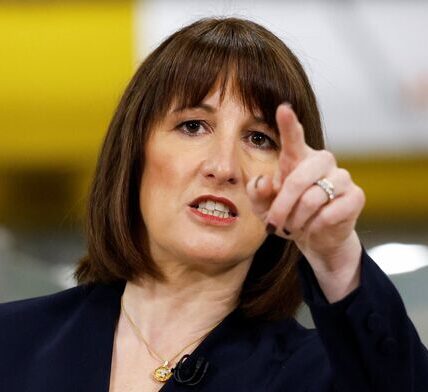Chancellor under pressure from supermarket bosses not to hike business rates in next month’s Budget

Rachel Reeves is being urged to exempt shops from a new surtax (Image: Anadolu via Getty Images)
Rachel Reeves has been warned not to drive up food bills for millions of squeezed households by clobbering retailers with punishing tax hikes. Bosses of Britain’s biggest supermarkets have implored the Chancellor to exempt shops from a new business rates surtax in next month’s crunch Budget.
Grocers including Tesco, Asda, Sainsbury’s and Morrisons signed a letter to Ms Reeves urging her to ditch the plans. In their letter to the Chancellor, supermarket bosses, which also included those from Lidl, Aldi, Iceland, Waitrose and M&S, claimed households would “inevitably feel the impact” of any potential tax increases on the industry, such as higher business rates.

Tesco chief executive Ken Murphy (Image: Parsons Media)
On Sunday, Health Secretary Wes Streeting admitted there were issues with the economy and said households were also feeling the squeeze.
However, the Treasury said tackling food price inflation was a “priority” and said it was lowering business rates for “butchers, bakers and other shops”.
It comes amid reports that Ms Reeves could increase income tax as she desperately searches for extra cash to bolster the Treasury’s coffers.
But another of the Chancellor’s mooted money-raising plans, for a “mansion tax”, was criticised by former Bank of England governor Lord King on Sunday as “back of a fag packet” stuff.
Ms Reeves is widely expected to hike taxes next month following gloomy economic forecasts and a series of U-turns on cuts to welfare spending, which have made it more difficult for her to meet her self-imposed borrowing rules.
After announcing tax rises of £40billion in her nightmare Halloween Budget last year, which included a hike in the amount employers are required to pay in National Insurance Contributions, the Chancellor said she was “not coming back” for more tax rises.
But economists at the influential Institute for Fiscal Studies (IFS) have calculated a shortfall of at least £22billion in the public finances and suggested she will “almost certainly” have to raise taxes.
Some economists say the black hole could be as much as £50billion.
Soaring borrowing costs, weaker growth forecasts and spending commitments made since the spring have been blamed.
Mr Streeting warned the public finances are in a “challenging state” but insisted there were “green shoots” of economic recovery.
He told GB News: “We’re going to wait for the Chancellor to set out her Budget. People can see the public finances are in a challenging state.
“So is the economy, but also so are family finances, so are business finances, we recognise that, we’ve got to get our economy growing again.”
It comes as the cost of many staple goods has spiked, with butter prices up by 19%, milk 12%, and chocolate and coffee rising 15%.
Higher taxes and minimum wage bills have hit supermarkets, and food inflation has also surged in part due to poor harvests globally.
Escalating trade tensions also have an impact.
Helen Dickinson, chief executive of the British Retail Consortium, which represents the UK’s major supermarkets, said retailers were “doing everything possible to keep food prices affordable”.
“But it’s an uphill battle,” she said, “with over £7billion in additional costs in 2025 alone,” citing higher taxes.
The boss of Tesco, Ken Murphy, has previously said that “enough is enough” on business taxes.
The UK’s largest supermarket said the higher National Insurance rate had cost it £235million this year.
Tesco has upgraded its earnings outlook for the year, with expectations of full-year profits of between £2.9billion and £3.1billion.
Lidl revealed this week that its profits had surged threefold. Sales jumped by 7.9% as pre-tax profits hit £156.8million, up from £43.6million a year earlier.
On Saturday, the Daily Express exclusively revealed that Kemi Badenoch vowed to kick-start a high street boom by pledging to abolish business rates for 250,000 retailers.
The Tory leader says the move will help revive ailing town centres “suffering” under Labour.
The Treasury said that business rates would be adjusted to reflect changes in the overall value of the tax base, “so that the system continues to raise the same amount of revenue in real terms”.
“If the total value of rateable properties increases, the tax rate will generally fall,” it added. “This means that even if a specific property’s RV goes up, its bill could still decrease if the reduction in the tax rate is large enough to offset the increase in value.
“Ultimately, what businesses pay after a revaluation depends on both the new RVs and the adjusted tax rate.”
In response to reports that Ms Reeves is considering hitting owners of properties worth £2million and above, Lord King said: “You don’t solve that problem by just adding another wealth tax to it.”
He told Sky News’ Sunday Morning with Trevor Phillips: “That is not a coherent tax strategy. And you could do a great deal by thinking it through first.”
Ms Reeves is due to visit Saudi Arabia on Monday in a desperate search for economic growth.
The Chancellor will use the visit to Riyadh to try to make progress on a trade deal with the Gulf Co-operation Council.
The Chancellor said: “Our number one priority is growth, so I am taking Britain’s offer of stability, regulatory agility and world-class expertise directly to one of the world’s most important trade and investment hubs, making that case in our national interest.
“After our landmark deals with the US, EU and India, we’re determined to build on that momentum by going further and faster on partnerships that create good jobs, boost business and bring investment into communities across the UK – from the North East to the Oxford-Cambridge corridor.”
